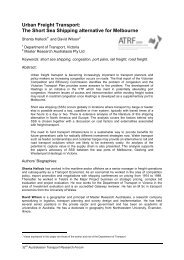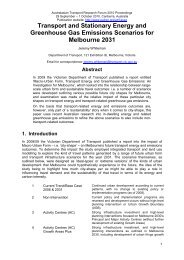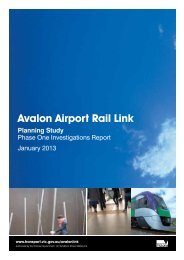victorian electric vehicle trial mid-term report - Department of Transport
victorian electric vehicle trial mid-term report - Department of Transport
victorian electric vehicle trial mid-term report - Department of Transport
- No tags were found...
You also want an ePaper? Increase the reach of your titles
YUMPU automatically turns print PDFs into web optimized ePapers that Google loves.
The appeal <strong>of</strong> a financial incentiveto defer charging was investigatedwith the entire sample <strong>of</strong> householdparticipants. With reference toFigure 37, the bias in the results wastowards maximising the <strong>vehicle</strong> utility.This result is consistent with findingsfrom the Ergon Energy EV <strong>trial</strong> inQueensland, where drivers pushedback on mandatory deferred charging<strong>of</strong> their <strong>vehicle</strong> under the ‘Tariff 33’arrangement that is more generallyapplied to pool-pumps (Ergon 2012).In late 2012, a small group <strong>of</strong><strong>trial</strong> household participants wereselected to take part in an <strong>electric</strong>itydemand response and load controldemonstration project – refer to thebreakout box below. These householdswere equipped with DiUS Computing’sChargeIQ EV charging outlet, whichwas bound to their residential smartmeter upon installation. The objective<strong>of</strong> the project was to demonstrateuse <strong>of</strong> Victoria’s Advanced MeteringInfrastructure for the purposes <strong>of</strong>managing EV charging demand.A total <strong>of</strong> 64 charge-managementevents were deployed by thedistribution network operator for theregion, split between ‘peak charging’events for which 24 hours’ noticewas provided to participants, and‘emergency charge management’events for which just one hour noticewas provided. Results from a survey<strong>of</strong> participants indicated widespreadacceptance <strong>of</strong> the charge managementmethod and technology, to the extentthat the majority <strong>of</strong> participants wouldagree to have their charging managedthis way in future even if there was n<strong>of</strong>inancial benefit to them.This outcome suggests that smartgrid, or other charge managementtechnologies, will be effective in themanagement <strong>of</strong> EV charging so as toavoid costly network investments.Would you be open to having your <strong>vehicle</strong> charge when it wascheaper rather than as soon as you plugged in?Yes, but only ifmy <strong>vehicle</strong> wasfully chargedwhen I needed itYes, if itprovideda betterenvironmentaloutcomeYes, but onlyif it were halfthe costNo0% 10% 20% 30% 40% 50% 60% 70% 80% 90%Figure 37. Results from a survey <strong>of</strong> <strong>trial</strong> household participants on their outlook towards deferred charging in responseto a financial incentive; survey interval was around six weeks into their EV experience (n = 77; multiple choices permitted).CREATING A MARKET 67
















